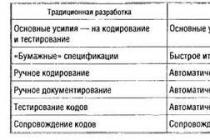Legal regulation of activities business companies- this is a set of legal norms that regulate legal relations that arise in the course of the activities of business entities. In the legal regulation of the activities of business entities, four groups of legal norms can be distinguished:
· a system of legal norms regulating the methods of operation of enterprises (internal organizational and economic activities) and the processes of their organization (creation, reorganization, liquidation);
a system of legal norms governing legal relations in the processes of production and state activities: in the creation of products and technologies, in the development of production, in the manufacture of products and the provision of services, in marketing activities;
a system of norms governing the legal relationship between organizations state power and management and enterprises of various organizational and legal forms;
· system of norms of arbitration consideration of economic disputes (norms of arbitration procedural law).
Legal regulation method is a set of methods and techniques for regulating relations between subjects.
Dispositive methods include:
coordination, - that is, the subject of a legal relationship independently resolves a particular issue, and when entering into a legal relationship with other subjects of legal regulation, issues are resolved in a coordinated manner;
The imperative methods are:
Mandatory prescriptions - that is, one side of the legal relationship gives the other side a prescription that is mandatory for implementation;
prohibition - that is, one side of the legal relationship prohibits this or that activity to the other side.
Principles of legal regulation- these are the fundamental principles that apply to the entire range of legal norms that ensure the regulation of the activities of business entities. Among the principles of legal regulation are:
The principle of purposefulness of influence - on the achievement of mutual interests as a result economic activity subject of economic legal relations;
the principle of equality of subjects of economic legal relations, regardless of the level they occupy in the national economic complex: that is, the rules of law governing their economic relations equally apply to all participants in these relations;
the principle of economic freedom and encouragement of entrepreneurial behavior economic organizations;
the principle of promoting fair competition and protection against monopoly and unfair competition;
The principle of the complexity of the state impact on economic relations through a combination of economic, organizational, administrative and political mechanisms that make it possible to purposefully direct the motivation of the activities of various social groups(entrepreneurs, managers, specialists, direct participants in production and economic processes - workers) to achieve socially necessary economic results;
The principle of legality - in the conditions market economy the basis for assessing legality is the achievement economic efficiency activities in the interests of the state and society without violating the prohibitions of the law and the rights of others.
Under source of legal regulation refers to the will of the state expressed in an act of a competent state body. These acts in the legal regulation of economic activity of enterprises are:
1) The Constitution of the Russian Federation - main source the whole system of law;
3) Federal Laws of the Russian Federation
4) Decrees of the President of the Russian Federation issued in addition to or development of laws, if there are gaps in them and, if necessary, the prompt establishment of legal norms;
5) Decrees of the Government of the Russian Federation, issued within its competence in the development and implementation of laws;
6) acts of ministries and departments aimed at the implementation of laws, Decrees of the President of the Russian Federation and Decrees of the Government of the Russian Federation;
7) acts of regional authorities and administrations issued within their competence, in accordance with the delimitation of powers between the Russian Federation and the subjects;
8) acts of local authorities and administrations that have an economic and legal content. Maksimov I.M. Legal regulation of economic activity. Tutorial. - Tambov: Ed. TSTU 2002. S. 13-15
The hierarchy of all normative acts regulating the activities of business entities is headed by the Constitution Russian Federation The Constitution of the Russian Federation of December 12, 1993 (subject to amendments of December 30, 2008 N 6-FKZ and of December 30, 2008 N 7-FKZ) // " Russian newspaper", N 7, 21.01.2009 .. The country's Basic Law guarantees citizens the right to association (Art. 30), the right to private property (Art. 35), the right to appeal against the actions (inaction) of state authorities, bodies local government And officials(Article 46). Management in a Joint Stock Company: Textbook // Allpravo.Ru team of authors - 2006.
In the Civil Code of the Russian Federation, the second paragraph of the fourth chapter is devoted to business partnerships and companies. It gives the basic provisions on business companies, the rights and obligations of participants in business companies, the transformation of business companies. Also, it discloses the legal provisions of each individual type of business companies (joint stock companies, limited and additional liability companies).
Federal laws determine the specifics of the legal status of business companies in the specified areas of activity, and have a special character of legal regulation of the activities of business companies. The main federal laws regulating the activities of business entities are: the Federal Law “On Limited Liability Companies” and the Federal Law “On Joint Stock Companies”.
The system of legal regulation of the activities of all commercial organizations consists of legislative, other legal acts and internal documents adopted by the organization itself within the framework of local rule-making. Legislation, in the broad sense of the word, as a set of not only federal laws, but also all legal acts of various industries, in a market economy cannot provide sufficient completeness of legal regulation of the activities of business entities.
Legislation constitutes the basis that determines the legal status of a business entity and forms the basic principles of legal regulation of the behavior of participants in the relevant relations: management bodies and shareholders (participants), the employer and employees, and also delimits the subject of legal regulation legislative norms and the norms of internal documents, establishes the limits of independent discretion, within which local rule-making of a commercial organization can develop.
The adoption of certain internal documents is directly provided for by law. The other part is created at the discretion of the business entities themselves, depending on the scope and scale of their business activities, the composition of participants, the characteristics of the production and economic structure of the organization, the territorial location of its structural divisions, the customs of business turnover and simply experience, the traditions of the relationship between the team and management, shareholders ( participants) and managers D. M. Sork. Legal regulation of economic activity // D.M. Sork, E. N. Belousov, E. A. Lisovskaya, N. G. Zamorenova. M.: Academy, 2011. S. 47. .
Prior to the entry into force of federal laws on business entities, documents adopted by an enterprise (organization) that regulate it internal activities, were called local regulations. To a greater extent, they concerned the social and labor sphere, although other things were not excluded (the provisions on structural divisions, enterprise standards). With acceptance federal law“On Joint Stock Companies” a new concept has appeared - internal documents, the subject of legal regulation of which are mainly the organization and activities of management and control bodies joint-stock company, although otherwise is also not excluded: it is possible to approve the regulations on branches, on funds and reserves, on the payment of dividends, on the sale priority right shareholders of CJSC for the acquisition of shares sold by other shareholders and others. After a careful analysis of the essence of the categories "local regulations" and "internal documents" of the organization, we come to the conclusion that they have a single legal nature and the difference between these terms is determined by the subject of regulated relations, but rather even by the habit of naming documents adopted in the field labor relations, local regulations, and in the field corporate relations- internal documents. Since the essence of local regulations and internal documents completely coincides, the emergence of a new term - "internal documents", in my opinion, does not exclude the use of the traditional category - "local regulations", and these concepts can be used as equivalent.
In conclusion, I would like to note that for every modern commercial organization, regardless of its organizational and legal form and the scope of entrepreneurial activity, the creation of its own corporate culture- a set of values, principles and rules of activity that would be shared by all employees, administration, management bodies of the organization. In creating and maintaining the corporate culture of an organization, local rule-making is essential, which is formed on the basis of legal regulation of the organization's activities. Any business entity carries out its activities within the legal framework. Moreover, himself legal status and the rights and obligations corresponding to this status are again the scope of the rule of law. The legislation of the Russian Federation defines a number of rules governing the status, legal status, organizational and legal form of business entities, as well as the rights and obligations of subjects of economic legal relations.
INTERREGIONAL ACADEMY OF HR MANAGEMENT
(MAUP)
INSTITUTE OF INTERNATIONAL ECONOMY AND FINANCE
(IMEF)
Group index E-10-06-BMR (2.3)
Surname, name, patronymic of the student
Ivantsova Natalya Pavlovna
Home address Belaya Tserkov
st. Levanevskogo d. 18, apt. 155
Name of organization, position
Zaliznichnaya branch of Prominvestbank
in Kyiv, st. economist
TEST
in the discipline "Economic Law"
option 2
Kyiv 2007
1. Legal regulation of the activities of business partnerships
2. Test
3. Test
4. List of used literature
Issue 1. Legal regulation of the activities of business partnerships
Relations in the sphere of economic management are regulated by the Constitution of Ukraine (254k/96-VR), this Code, laws of Ukraine, legal acts of the President of Ukraine and the Cabinet of Ministers of Ukraine, legal acts of other public authorities and local governments, as well as other regulations .
FEATURES OF LEGAL REGULATION IN CERTAIN FIELDS OF ECONOMY
AREAS AND TYPES OF ECONOMIC ACTIVITIES
1. Features of legal regulation economic relations are determined depending on the sphere of social production in which these relations develop, the characteristics of the area of management, the type of economic activity, economic form the result of economic activity, spacious, on which economic relations are formed (internal or foreign market), features of subjects between which there are economic relations.
2. Legal regulation of economic relations is carried out taking into account the social division of labor that has developed and objectively existing areas National economy.
3. Features of the legal regulation of foreign economic relations are determined by Section VII of this Code.
1. The type of economic activity takes place in the case of pooling resources (equipment, technological means, raw materials and materials, work force) to create the production of certain products or the provision of services. An individual activity may consist of a single, simple process, or it may cover a number of processes, any of which fall within the relevant category of the classification.
2. In the legal regulation of economic activity and in the implementation government controlled the national economy should take into account the peculiarities of the implementation of economic entities certain types this activity.
3. To assign a business entity to the relevant category of accounting, the main, secondary and auxiliary types economic activity.
4. In order to provide the system of state management of the national economy with accounting and statistical information that satisfies the needs of participants in economic relations in objective data on the state and trends of socio-economic development, economic and financial relationships at the interstate, state, regional and sectoral levels, as well as the introduction international standards in the field of accounting and reporting and transition to the international system of accounting and statistics, the Cabinet of Ministers of Ukraine approves measures for the development of national statistics of Ukraine and state system classification of technical, economic and social information.
5. An integral part of the state system of classification and coding of technical, economic and social information is the classification of species economic activity(KVED), which is approved by the central authority executive power on standardization issues and has the status state standard.
6. The objects of classification in KVED are all types of economic (economic) activities of entities.
1. The set of all production units that carry out predominantly the same or similar activities production activities, constitutes an area.
2. General classification areas of the national economy is an integral part unified system classification and coding of technical, economic and statistical information that is used by business entities and other participants in economic relations, as well as state authorities and local governments in the process of managing economic activities.
3. Requirements for the classification of areas of the national economy are established by law.
1. To the sphere material production lie areas that are defined by activities that create, restore or find wealth(products, energy, natural resources), as well as continue production in the sphere of circulation (realization) by moving, storing, sorting, packaging products or other activities.
2. All other types of activity in their totality constitute the sphere of non-material production (non-productive sphere).
1. Logistics and marketing of industrial and technical products and products consumer goods How own production, and acquired from other business entities, are carried out by business entities by delivery, and in the cases provided for by this Code, also on the basis of sales contracts.
2. Legislation may provide for the specifics of the supply of certain types of products for industrial purposes or consumer goods, as well as a special procedure for the supply of products for state needs.
3. The main requirements for the conclusion and execution of supply contracts are established by this Code and other legislative acts.
1. Under the supply contract, one party - the supplier undertakes to transfer (deliver) the goods (goods) to the second party - the buyer within the stipulated time (term), and the buyer undertakes to accept the specified goods (goods) and pay a certain amount of money for it.
2. The supply contract is laid down at the discretion of the parties or, respectively, state order.
3. The parties to the supply agreement may be business entities specified in paragraphs 1, 2 of the second part of Article 55 of this Code.
A partnership is formed by share capital, which is divided into shares. So economic partnerships operate on the basis of only the constituent document, where the division into shares is fixed.
In a business partnership, a founding agreement is required, since the system of management bodies is simple, since there is no need to create special control and executive bodies.
So in a full partnership, the founding document is the memorandum of association.
Entrepreneurial activities of general partnerships have the right to conduct on behalf of the partnership, that is, to be its body.
Accordingly, other bodies of the partnership may be indicated in the memorandum of association.
- - Firstly, business activities can be carried out jointly. Since the conclusion of any transaction requires a unanimous decision of all comrades.
- - secondly, the very conduct of entrepreneurial activity can be entrusted to a certain comrade. Since the rest will have the right to conclude a transaction only if there is a power of attorney from authorized comrades. At the same time, it should be noted that such a power of attorney can only be issued to contributors (in a limited partnership) or general partners, and not to third parties.
A general partnership has the right to conduct business activities on the very name of the partnership, then, accordingly, the partner must have the status individual entrepreneur, that is individual must be a legal entity of a commercial type or an individual entrepreneur.
The founding document defines:
- - information about the content of the company name and the location of the place of partnership;
- - the procedure and conditions for the distribution of profits and losses between the participants;
- - activities of the partnership management procedure;
- - the procedure for the very procedure for the withdrawal of founders from its composition;
- - conditions on the composition and amount of share capital;
- - the procedure and amount of change of each of the participants in the shares in the share capital;
- - the term, size, composition and procedure for making contributions;
- - liability of participants for violation of obligations to make contributions.
A limited partnership operates and is created on the basis of a founding agreement.
In a limited partnership, investors can be any entities to whom this is not prohibited by law. Clause 6 of Article 66 of the Civil Code of the Russian Federation establishes a ban on state bodies and bodies of local local self-government that are not entitled to participate on their own behalf in business partnerships. The peculiarity of the legal status of limited partners is that:
- - firstly, they do not participate in the activities of the partnership and are not liable for its obligations;
- - secondly, participation in their partnership may not be disclosed.
Thus, the memorandum of association specifies:
- - information containing the location and company name of the partnership;
- - conditions of the share capital the size and composition of the partnership;
- - the amount and procedure for changing each of the general partners' shares in the share capital;
- - the procedure, size, composition, term for making their contributions;
- - liability for violation of obligations to make deposits;
- - Contributed by the contributor total amount of the contribution.
Thus, the participation of the subject is allowed anonymously as limited partners on faith.
Accordingly, in a full partnership, the constituent agreement is signed by all its participants, and in a limited partnership by all full partnerships.
Send your good work in the knowledge base is simple. Use the form below
Students, graduate students, young scientists who use the knowledge base in their studies and work will be very grateful to you.
All business entities wishing to work in the wholesale market electrical energy Ukraine, must sign the treaty as a whole, without any reservations.
H practice to classify the contract as public contract or the accession agreement will not be so simple. If, as part of the contract retail purchase and sale the issue is regulated by the Civil Code of Ukraine itself, then in relation to other contracts not mentioned in the code, the same contract for the supply of electricity or an agreement wholesale market electric energy of Ukraine, which were mentioned above, the question remains open. Hence the circle contractual relations regulated by the accession agreement should be determined directly in the acts of civil legislation.
There are statements in the legal literature that one of the main areas of application of the accession agreement is relations with monopolists, which, due to the lack of competition, impose their conditions on counterparties in the form.
P in relation to monopolists, and especially to natural monopolists, it is necessary to apply the practice of approving standard contracts for the purchase of their goods or the provision of services by them by the body that regulates the activities of monopoly entities, which will balance the interests of the monopolist and the consumer of his goods, works or services.
Attention should be paid to the norms of the Civil and Commercial Codes of Ukraine regarding standard contracts .
In the practice of regulation of contractual relations of business entities are currently quite widely used standard forms, the so-called model or exemplary contracts. Standard contracts, as a rule, are approved by the Cabinet of Ministers of Ukraine or executive authorities by issuing regulatory legal acts.
Prior to the adoption of the new codes, Ukrainian legislation lacked a clear definition of standard contracts. In the new codes, the definition is present, but the concepts of the standard contract and the procedure for its application differ.
From the meaning of Article 630 of the Civil Code of Ukraine it follows that the application or non-application standard contract for the execution of the transaction depends on the will of the parties to the contract. Proceeding from this position, a standard contract is a recommendation for the parties to the contract to agree on its individual conditions.
The Economic Code of Ukraine takes a different position on this issue. The provisions of this code are standard and exemplary contract regulates the order in which they are applied.
Thus, Article 179 of the Commercial Code of Ukraine determines that when concluding a business contract, the parties may determine the text of the contract on the basis of:
- free will, when the parties have the right to negotiate at their own discretion any terms of the contract that do not contradict the law;
An exemplary agreement recommended by the management body to business entities for use when they conclude agreements, when the parties have the right, by mutual agreement, to change certain conditions provided for exemplary contract, or supplement its content;
Model contract approved by the Cabinet of Ministers of Ukraine, or in cases provided for by law, by another state authority, when the parties cannot deviate from the content of the model contract, but have the right to specify its terms;
An accession agreement proposed by one of the parties for other possible subjects, when these subjects, in the event of entry into the contract, do not have the right to insist on changing its content.
How kind But , the codes follow the diametrically opposite order of application of the standard contract.
Given the inconsistency between the norms of the codes in matters of contractual relations, for practical application provisions of the codes, it is important to determine the role of each code in their regulation.
A furious controversy erupted in the legal literature regarding the correlation between the norms of the Civil and Commercial Codes of Ukraine.
The opinions of scientists regarding the correlation of codes are divided, in the legal literature this issue is widely debated.
Civilists argue about the supremacy of the Civil Code of Ukraine . ABOUT neither believe that the Civil Code of Ukraine is the fundamental normative act, according to which the legal regulation of all property relations of a commodity-money nature is carried out, in other words, the code is a law of both general application and a special law, and the regulation of property relations of business entities is regulated by the Economic Code Ukraine ( 23 ). And since the Civil Code of Ukraine has great legal force, in the event of a conflict of norms of the codes, one should be guided by the law with greater legal force.
Their opponents assign the role of a general law to the Civil Code of Ukraine, and the role of a special law to the Economic Code, which defines the features of regulating relations in the sphere of management. Supporters of the Economic Code of Ukraine believe that its norms, as special in the field of economic relations, are a priority, and only if there are no certain provisions in the Commercial Code of Ukraine, relations should be regulated by the norms of the Civil Code of Ukraine.
For example, A. Bobkova argues that such a ratio of codes is confirmed by the norms of the codes themselves. Thus, part two of Article 9 of the Civil Code of Ukraine admits that the law may provide for special regulation of property relations in the field of economic management, and this article corresponds to part two of Article 4 of the Economic Code of Ukraine, according to which the specifics of regulation of property relations of business entities are determined by this code ( 2 ).
B More convincing is the opinion of scientists that legal relations in the field of entrepreneurship, and therefore contractual relations in this area, should be regulated by the norms of the Economic Code of Ukraine.
P The problem of separating civil legal relations from relations in the sphere of economic management is debatable today, and should be solved by improving the norms of both codes, as well as in the process of practical application of their provisions.
2. Test
Mark the correct answer.
The subject of legal regulation of economic activity consists of:
A) the basic principles of economic management in Ukraine defined by the legislation of Ukraine, economic relations that arise in the process of organization and implementation of non-commercial economic activity between state bodies - business entities, consumers, internal affairs bodies, prosecutor's office, court (owner's court), supervision and control of higher authorities over this activities for profit.
b) economic relations defined by international legal norms and legislation of Ukraine that arise when business entities carry out entrepreneurial activities, supervision and control over this activity by the state in order to coordinate the markets for goods and services in Ukraine and their movement across the customs border.
V) the basic principles of economic activity in Ukraine defined by the legislation of Ukraine, economic relations that arise in the process of organizing and carrying out economic activities between economic entities, between economic entities and other participants in economic relations, supervision and control of this activity by the state in order to eliminate illegality in the field of management, which can lead to negative consequences both for business entities, entrepreneurs and consumers, and for the economy of Ukraine as a whole.
Correct answer - answerIN
The main principles of economic management in Ukraine defined by the legislation of Ukraine, economic relations that arise in the process of organizing and carrying out economic activities between economic entities, between economic entities and other participants in economic relations, supervision and control of this activity by the state in order to eliminate illegality in economic area, which can lead to negative consequences both for business entities, entrepreneurs and consumers, and for the economy of Ukraine as a whole.
3. Test
Mark the excess
For the state registration of a business entity, the following documents are submitted:
A) decision of the owner (owners) of the property or a body authorized by him (them) in cases provided for by law;
b) a notarized receipt of one of the spouses (in case of being legally married at the time of registration) about his consent to engage in economic activity of the spouse;
V) constituent documents provided by law for the relevant type of legal entities;
G) decision of the Antimonopoly Committee of Ukraine on consent to the creation, reorganization (merger, accession) of business entities in cases provided for by law;
d) a document (documents) that certifies the payment by the founder (founders) of the contribution to the authorized capital of a business entity in the amount established by law;
e) a standard postal package as a guaranteed deposit in a timely manner state registration;
and) registration card of the established form;
h) a document that certifies the payment of funds for state registration;
And) a document that certifies the non-conviction and non-custodial status at the time of the establishment of the enterprise.
b) a notarized receipt of one of the spouses (in case of staying during registration in a legal marriage) about his consent to engage in economic activity of the spouse;
e) postal package of the established form as a guaranteed fee for timely state registration;
And) a document that certifies the non-conviction and non-custodial status at the time of the establishment of the enterprise.
List of used literature
1. Aksenov I. Some problems of legislative regulation of entrepreneurship. - 1998. - No. 1.
2. Bobkova A.G. On the ratio of GC and HC of Ukraine// Legal practice. - 2003. - No. 30. - p.10
3. Bobkova A.G. Legal support recreational activities. - Donetsk: South - East, 2000. - 308 p.
4. Vasiliev A.S., Muchnik A.G. Legislative protection of social interests as a way of managing the economy. - Odessa: Astro Print, 1999. - Vol. 2. - S. 210 - 218.
5. Gaivoronsky V., Zhushman V. Entrepreneurship, economic and labor activity: legislative regulation. - 1998. - № 9.
6. Code of the Lord of Ukraine. - K.: Truth, 2003.
7. Gospodarsky Procedural Code of Ukraine // Code of Ukraine. - K., 1998. - Book. 1.
8. Gruzinsky I.M., Kravchuk V.M., Pogranichny E.P. Sovereign registration of sub "acts in subprincipal activity: Nauk. - prakt. posib. - L., 2000.
9. Guyvan P. Standard contract and its place in the regulation of contractual relations// Pdpriyomnitstvo, statehood and law. - 2003. - No. 9. - p. 10
10. Znamensky G.L. Economic legislation of Ukraine: formation and development prospects. - 1996. - 63 p.
11. Ionov V. Business - law: Textbook. - M.: PRIOR, 1998.- 112 p.
12. Krat V. Contract of admission: realities and prospects // Business, government and law. - 2003. - 2003. - No. 1. - p.50
13. Kruglova N.Yu. Economic law. - M.: Rus. Business literature, 1997. - 608
14. Kurbatov A.Ya. The combination of private and public interests in the legal regulation of entrepreneurial activity. - M., 2001. - 212 p.
15. Laptev V.V. Business Law: concept and subjects. - M., 1997.
16. Magaziner Ya.M. Soviet economic law. - M., 1928.
17. Mamutov V.K. Legal regulation of economic activity in a mixed economy // Economy - law - state regulation: Sat. scientific works. - Donetsk: IZPI NAS of Ukraine, 1993. - S. 3 - 17.
18. Nazarov Yu. Guarantees of freedom of entrepreneurial activity in the field of registration. - No. 1. - S. 22 - 26.
19. Petrov I.V. Commercial Law: Textbook. - St. Petersburg: Publishing house - in Mikhailov V.A., 2001. - p. 656.
20. Podtserkovy O.P. Deregulation of economic processes and change in the mode of normalization of settlement relations in Ukraine. - Odessa: AstroPrint, 1999. - S. 330 - 338.
21. Regulations on the state registration of sub"acts in the process of acquisition of activity: Decree of the Decree of the Cabinet of Ministers of Ukraine on 25.05.98.
22. Sanіakhmetova N.O. Pіdpriєmnitske right. - K., 2003.
23. Under the law of Ukraine / Ed. R. Cones. - H., 2000.
24. Civil law. Zagalna part: Pіdr.// Pіd. ed. Ya.M. Shevchenko. - K. - 2003. - p.14
25. Shnipko O. Day of business activity and main mind development in Ukraine // Business, government and law. - 2002. - No. 6.
26. Shcherbina V.S. Gospodarske Law of Ukraine. - K., 2003.
27. Shkredov V.N. Economy and law. - M., 1990.
28. Economics - law - state regulation. - Donetsk: IEPI NAS of Ukraine, 1992.
29. Yushchik O.I. Legal Reform: Deeper Understanding of Problems in Ukraine. - K., 1997. - 201s.
Similar Documents
Contradictions in the legal regulation of entrepreneurial activity in geodesy and cartography in Russia and ways to overcome them. Characteristics of the system of economic-legal contracts. Reorganization of business companies.
term paper, added 09/14/2006
The concept and science of economic law. Classification, principles and methods of legal regulation of economic relations, sources of economic legislation. Forms of state influence on business entities in the Republic of Belarus.
course of lectures, added 12/14/2011
The history of the development of partnerships as commercial organizational and legal forms, their main types. Civil law regulation of the creation and termination of the activities of general partnerships. Legal relations and liability of participants in a general partnership.
thesis, added 12/17/2014
Comparative characteristics and legal analysis of business partnerships and companies as the most universal forms of association and separation of property for entrepreneurial activity. Features and types of partnerships and societies. Affiliates.
abstract, added 03/03/2011
Essence of economic disputes. Protection of the rights of business entities. Consideration of economic disputes arbitration courts RF. Claim procedure for settling economic disputes. Features of consideration of economic disputes by arbitration courts.
presentation, added 09/04/2016
The study of the concept, essence, tasks of economic law. Economic legal relations: concept and types. Methods of legal regulation of economic relations. Pre-trial procedure settlement of economic disputes. Legal status of private enterprises.
cheat sheet, added 09/05/2010
concept state regulation economic activity, its legal mechanisms and methods. Features of the formation of responsibility in economic legal relations: concept, types, functions, grounds for application. Essence and types of sanctions.
test, added 03/17/2015
Essence and general characteristics, distinctive features business partnerships and business companies. Maintenance of state and municipal enterprises, subsidiaries and affiliates. Rules for the execution of constituent documents of the partnership.
test, added 12/04/2009
Improving the legal regulation of activities gardening associations: the procedure for keeping records of income and expenses, circulation schemes and exemption from the submission of state statistical reporting. Income and profits of partnerships.
lecture, added 07/22/2012
Possession, use and disposal of joint property. Features of the legal regulation of the division of peasant property and property rights of spouses - participants in economic partnerships and societies. Property relations of former spouses.
aim term paper become full and system analysis legal status of a business partnership.
Based on the goal, it is necessary to solve the following tasks:
Give general characteristics business partnerships.
Identify similarities and differences between business partnerships and other forms of business organization
Consider the process of creating, operating and terminating a business partnership, conducting common affairs, the responsibility of contributors and general partnerships for the obligations of the partnership.
INTRODUCTION 3
1 GENERAL CHARACTERISTICS OF ECONOMIC PARTNERSHIPS 5
1.1 Business partnerships as organizational form 5
1.2 Comparative analysis with other forms of business organization 9
2 ESTABLISHMENT, OPERATION AND TERMINATION OF BUSINESS PARTNERSHIPS 14
2.1 Establishment of business partnerships 14
2.2 Conducting common business in the partnership 19
2.3 Liability of investors and general partnerships for partnership obligations 26
2.4 Termination of business partnerships 28
CONCLUSION 34
LIST OF USED SOURCES 36
The work contains 1 file
INTRODUCTION
3
5
5
1.2 Comparative analysis with other forms of business organization
9
2 ESTABLISHMENT, OPERATION AND TERMINATION OF BUSINESS PARTNERSHIPS
14
2.1 Creation of business partnerships 14
2.2 Conducting common business in the partnership 19
2.3 Liability of investors and general partnerships for partnership obligations 26
2.4 Termination of business partnerships
28
CONCLUSION
34
LIST OF USED SOURCES 36
INTRODUCTION
The relevance and necessity of research on this topic is due to the fact that the study of this institution allows you to find new solutions in the search for improvement, increase the efficiency of their functioning, makes it possible to trace the process of business partnerships. Latest to beginning of XXI centuries, along with other collective forms of entrepreneurship, occupy a dominant position - both in small and large-scale business.
The types of commercial organizations that I consider, such as general and limited partnerships, are traditional, and both earlier and today, the most common forms of collective entrepreneurship in ordinary property turnover. Historically, these economic entities have been entrenched as the need to pool capital for joint activities related to making a profit. In the process of their origin and development, they were called trading partnerships, since commercial activity was identified, first of all, with trade.
Later, the family became the natural unit for trading. This is how a family partnership appeared with very close ties between its participants. At the basis of such a partnership was not the desire to form a joint capital, but the desire to prevent the distribution of what was already drawn up.
It should be noted that economic (commercial) partnerships were understood not only as economic partnerships, but also as companies. This is due to the fact that partnerships and societies have many common features.
At the same time, the legislation of the Republic of Belarus distinguishes between partnerships as an association of persons and companies as an association of capital. From this follows another difference - the obligatory personal participation in the affairs of the partnership, in contrast to the society, which does not involve such participation. There is also a difference in the design of these commercial organizations. Thus, in society, along with founding agreement a necessary condition is the presence of a charter, in contrast to a partnership, where only an agreement is required. In addition, in societies there is no personal liability of their members for the debts of the company, which distinguishes them in this respect from partnerships. There are many other differences and characteristics of an organization.
The purpose of the course work was a complete and systematic analysis of the legal status of a business partnership.
Based on the goal, it is necessary to solve the following tasks:
- Give a general description of business partnerships.
- Identify similarities and differences between business partnerships and other forms of business organization
- Consider the process of creating, operating and terminating a business partnership, conducting common affairs, the responsibility of contributors and general partnerships for the obligations of the partnership.
In my work, I analyzed in detail the legal status, structure and features of precisely such forms of collective entrepreneurship as a general and limited partnership.
The general methodological basis of the study is the analytical method, the method of comparative analysis, the dialectical method of scientific knowledge.
The theoretical significance of the work lies in the fact that, based on the analysis of the literature of such authors as Vabishchevich S.S., Shershenevich G.F., Asknaziy S.I., Funk Ya.I., Tomkovich R.R. and others, as well as on the basis of an analysis of the Civil Code of the Republic of Belarus, the Housing Code of the Republic of Belarus, the periodical "Law of Belarus", and a number of textbooks on civil law it was determined that a business partnership is an independent institution in civil law that requires further in-depth study and improvement.
1 GENERAL CHARACTERISTICS OF ECONOMIC PARTNERSHIPS
1.1 Business partnerships as an organizational form
The idea of combining personal efforts and property in order to achieve economic goals arose in ancient times. Since ancient Egypt and Ancient Greece civil law contains norms that formalize these relations. But the idea of a comradely association received proper legal consolidation only in Roman law, after which the process of formation of the first commercial organizations begins.
The simplest form of association is the partnership agreement (societas). This is a consensual agreement, an agreement between two or more persons to participate in the joint achievement of a common permitted goal by common means.
Historically, the partnership agreement originated from an agreement between brothers after the death of their father not to divide property and continue to run a common household. The basis for its appearance was the family or inherited community of property.
From a legal point of view, ancient Roman partnerships are a bilateral agreement on the association of property owned by comrades on the basis of common ownership in order to achieve a common economic goal. It is significant that the participants in the partnership were jointly and severally liable for the negligence of any partner, that is, they assumed the risk of conducting business activities within the framework of the partnership.
The partnership was not recognized as a subject of law, could not be recognized as a legal entity, neither in relation to the participants themselves, nor in relation to third parties.
In ancient Rome, private individuals played a leading role in trade. The legal entity has not been widely developed. In Roman law there was no term "legal entity" itself.
And among the existing legal entities, there were no private-law business associations based on a contract. The question whether the Roman partnerships and corporations are precursors to the present forms of commercial organizations must be answered in the negative.
"There is no successive connection between Roman societas and modern partnership, but one cannot, however, deny the influence of Roman law on the later understanding of this form of association."
The next stage in the development of trading partnerships is the period of the Middle Ages . The economy is becoming increasingly commodity in nature and needs various kinds of associations for trading. The first trading partnerships are found in the X-XI centuries. There is an accumulation of capital, the emergence of full-fledged money, the development of trade. Under these conditions, the family was, first of all, a natural association for conducting trade. This is how a family partnership with very close ties arose, known as the compagnia fraterna, societas fratrum.
The inclusion of the family in the economic circulation led to the fact that after the death of its head, the heirs did not seek to share the hereditary property, but to preserve the existing enterprise. This form could not appear in Roman law due to the dependence and subordination of family members to its head. Medieval customs are the source of origin and the only source of regulation.
Preservation of property in integrity was necessary, first of all, to the heirs. Despite the small role of credit in the economy, it was beneficial for creditors that property was not distributed among several persons. To maintain creditworthiness, family members made a promise, concluded an agreement on the "non-sharing" of property and the continuation of trade.
Over time, it turned into a general partnership agreement. Thus, at the heart of the medieval full partnership is not the desire to jointly build up capital, but the desire to prevent the distribution of what has already been drawn up. The main features and legal means of this partnership were to appear in circulation under a common name, including the names of all comrades. A trading company, formed by virtue of custom, was an external expression of legal personality, a legal personality, which was not in Roman law.
Accordingly, the independence of comradely property was recognized. Development within the framework of a family business has led to the joint and several full responsibility of partners in partnership affairs. At the same time, the creditors of the partnership had preferential satisfaction of their claims over the creditors of the comrades from the property of the partnership.
From a legal point of view, a limited partnership was the following. The founder announced the cost of the ship as fixed capital and how many parts the capital was divided into. The capital was expressed in terms of money, and contributions were made in money. The payment of the participation share exhausted all the obligations of the participants, although additional contributions could be provided.
Summing up the characteristics of the development of commercial partnerships and companies, we can draw the following conclusion. The need to concentrate capital, to combine efforts gave rise to partnerships, the legal form of which is a partnership agreement.
On the other hand, the expansion of commodity-money production led to the emergence of a legal entity, which made it possible to participate in civil circulation. These two trends existed in isolation, so legal entities and partnerships formed under contract law were regulated separately from each other.
From an economic point of view, the formation of a separate entity - a legal entity - is necessary everywhere and always, where there are more or less developed conditions for commodity-money turnover.
Various forms legal entity carry out the inclusion in the turnover of the total capital or any part of it. Therefore, the question of giving the status of a legal entity to commercial partnerships and companies inevitably arose. And as a result, their regulation is carried out by the norms of the law, and not by the norms of the law of obligations. The need to protect the interests of creditors required an exhaustive list of commercial partnerships and companies. The scope of obligations between participants in partnerships and companies is an exception to the principle of freedom to conclude contracts that are not named in the law. If the parties to the agreement proclaim the creation of a new partnership that is not regulated by law, then such an agreement is optional for third parties.
Entering into legal relations with such a "partnership", they have the right to consider that they are not dealing with a legal entity, but with a set of individuals whose liability is assumed on a general basis, that is, unlimited.
Legal entities created on the territory of the Republic of Belarus, in accordance with the provisions of the Civil Code of the Republic of Belarus (hereinafter referred to as the Civil Code of the Republic of Belarus), depending on the purpose of their activities, are divided into two large groups:
- commercial organizations;
- non-profit organizations.
Legal entities, the main purpose of which is to make a profit, are among the commercial organizations. They can be created in the following forms:














